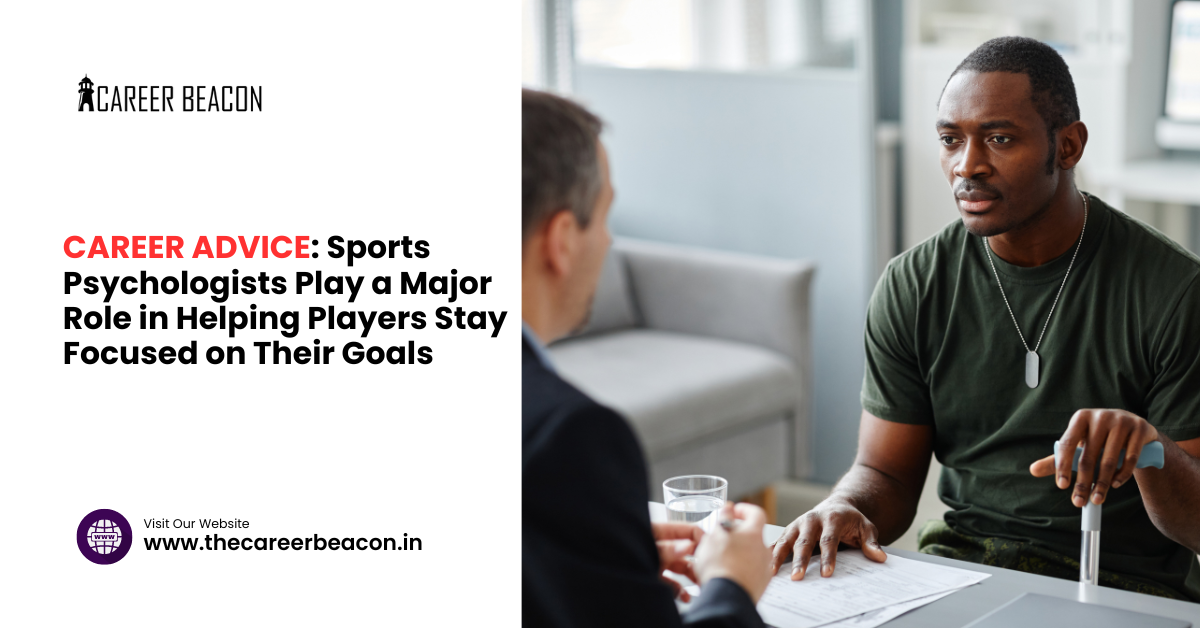
CAREER ADVICE: Sports Psychologists Play a Major Role in Helping Players Stay Focused on Their Goals
The fact proves that in today’s world, one needs to be tough mentally as much as physically in the context of a sportsman. Sportspersons are under enormous pressure, and they must remain goal-directed in their pursuit. Sports psychologists, on the other hand, help athletes prepare their minds for the game so that they can do their best. To anyone who is aspiring to build a career in this field, the career option in the field of sports psychology has the potential to influence the lives of players positively.
Why Sports Psychology Matters
Stress, anxiety, and lack of motivation are common issues that affect most athletes and can be useful to them. This is the role of a sports psychologist who ensures that such athletes are mentally fit to overcome such difficulties. This is a profession that focuses on using principles of psychology in an attempt to enhance a given athlete’s psychological state as well as performance on the field and in training sessions.
This paper aims to look at the responsibilities of sports psychologists.
In this case, the use of a sports psychologist to assist players in the self-organisation of the latter with a view of perceiving goals, optimal performance, and pressure. Therefore, they are important in enhancing mental toughness, and this has implications for sports performance.
Key Responsibilities of Sports Psychologists:
- Goal Setting: Assisting the athletes to set more effective and reasonable goals and objectives.
- Stress Management: Strategies used to address anxiety during game day.
- Motivation: maintaining the morale of the athletes during the winning streaks as well as during the losing streaks.
- Focus and Concentration: Coaching athletes to focus on the game, including coming up with ways of overcoming pressure.
- Emotional Regulation: Coaching the players to deal with such aspects as frustration, anger, and other feelings that may hinder performance.
For how one can become a sports psychologist, read:
The process of becoming a sports psychologist necessarily involves obtaining certain education, possessing certain skills, and having a passion for sports and psychology. Here’s a roadmap for those considering this rewarding career path:
Educational Requirements
- The initial prerequisite is to obtain an academic degree. A bachelor’s in psychology, sports science, or any related major.
- A master’s or doctoral degree in sports psychology or in clinical psychology is usually necessary.
- In some locations and specialities, certification might be required.
Develop Key Skills
- Communication: They stress that during the study, you will have to explain psychological concepts to others without making those others struggle with understanding.
- Analytical Thinking: Evaluating the mental fitness of an athlete must therefore involve an ability to observe and perhaps dissect the behaviour of the athlete.
- Empathy: So awareness and understanding of the pressures that the athlete is bound to encounter are critical in the process of assistance.
- Problem-Solving: Creating personal mental training for each of the athletes is also a good challenge as it allows using inspiration and thinking skills.
Gaining Practical Experience
- In sports, it is possible to gain practical experience through internships or working as an assistant for teams.
- Career guidance on the web provides users with an opportunity to get mentorship and advice to kick off this kind of job.
- Engaging in local-based sporting clubs or even interacting with the coaches and/or teams helps in making contacts and enhances the real-life experience.
Career Functions of Sports Psychologists
Sports psychology is a relatively new branch of psychology that offers quite a few jobs. This goes a long way from athletes, Olympics, and commonwealth to cross-country, schoolchildren, and indeed any youth teams. Sports psychologists can work in different environments, such as:
- Professional Sports Teams: Employment of athletes in major leagues.
- University Athletics Programs: Ensuring that college sportsmen do not neglect their studies while participating in college sports.
- Private Practice: To be used in providing services to individual athletes or to teams.
- Rehabilitation Centres: Helping them psychologically handle the injury that they need to recover from.
The Concepts of Career Consultation and Internet-Based Career Counselling
Like any other occupation, there are choices and challenges that one has to go through on his or her way to becoming a sports psychologist. Career advice means that you get the right information at any point during your career journey to make the right decision. There are useful services, such as online platforms for career guidance, that will help you get access to professional assistance, coaching, and mentoring to navigate this distinct type of career easily.
Why Career Advice is Crucial for Aspiring Sports Psychologists:
- Clarity on Career Path: This career advice makes it easier to note the educational and practical processes that need to be followed for any success.
- Skill Development: This enables you to understand which skills differentiate you in the job market depending on the endeavours that are pursued.
- Networking Opportunities: He or she can be referred by specialists in the sphere to an internship, a job, or further promotion in a career ladder.
The place that the online career guidance plays in your process
Currently, getting information has been made so easy given that people can acquire it from the comfort of their own houses. Career guidance platforms include features that are very helpful since they maintain your concentration on a relevant career path as a sports psychologist. Finding out about educational choices, internships, or employment chances, it is possible to get assistance from these websites to advance a career.
Benefits of online career guidance for sports psychologists:
- Access to Experts: Therefore, interact with experienced persons who will give practical insights into the issue.
- Flexible Learning: Continuing education degree programs and certificate courses that can be pursued from home.
- Mentorship Programs: Reach out to other professionals in the industry to advise you on the best way to go about it.
The Ways to Successfully Stay Focused on Your Career Goals
Just as there are courses in which the sportsman is encouraged to set his sight on the ball and goals, it is equally critical for the students wishing to be psychologists to set their sights on their objectives. Career information and online career counselling can be used as strategies to bring you back to focus.
Tips to Stay Focused on Your Career as a Sports Psychologist:
- Set Clear Goals: Break your long-term objectives into smaller, manageable milestones.
- Seek Mentorship: Find a mentor through online career guidance platforms to help you navigate your career.
- Stay Updated: Follow the latest trends and research in sports psychology to stay competitive.
- Balance Work and Learning: Manage your time effectively to gain experience while continuing your education.
Conclusion
Sports psychologists play a crucial role in the mental well-being of athletes, helping them stay focused on their goals and overcome challenges. If you’re considering a career in this dynamic field, remember that guidance is key to success. Whether through career advice from professionals or online career guidance platforms, the right support can help you achieve your dreams. Stay focused, continue learning, and you’ll be well on your way to becoming a successful sports psychologist.
By utilising the power of online career guidance and setting clear objectives, you can ensure a bright future in the field of sports psychology. This career not only allows you to work closely with athletes but also offers the opportunity to make a meaningful difference in their lives, both on and off the field.


